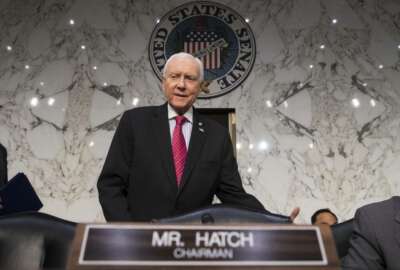
Trump signs new, flexible TSP Act into law
President Donald Trump has signed legislation allowing federal workers more flexibility in taking withdrawals from their retirement savings.
To listen to the Federal Newscast on your phone or mobile device, subscribe on PodcastOne or iTunes.
- President Donald Trump signed the TSP Modernization Act into law late Friday. The legislation removes the deadline for post-separation withdrawals and allows federal employees who are still working and over a certain age the option to make multiple withdrawals. The Federal Retirement Thrift Investment Board said it was working on regulations for the law and hoped to finish them by February. It is the first update of the federal employee savings program since its inception 30 years ago. First introduced by Sens. Rob Portman (R-Ohio) and Tom Carper (D-Del.), the changes in the law were something TSP officials said employees and retirees have long wanted. Employee groups and unions supported the changes. (Sen. Portman)
- The nearly $700 billion National Defense Authorization Act bill is on its way to President Trump’s desk. He is expected to sign it into law. Congress added in more money to the bill than the White House asked for, paying for more than $625 billion in base spending and $20 billion for nuclear security programs under the Energy Department, It also provides money to increase the size of the Army and Marine Corps, build more ships, boost research and development, and funding for more missile defense programs to counter the growing nuclear weapons threat from North Korea. (Federal News Radio)
- The Department of Veterans Affairs said it is exploring the idea of merging its Veterans Choice program into the Defense Department’s health system. A VA spokesman said the notion could be a “game changer” when it comes to giving veterans access to private-sector health care at lower costs to the government. The idea has received a chilly response from members of Congress and veterans groups, who haven’t been consulted on the details of the plan. The Pentagon said it has been in talks with VA on a number of options to improve service member and veteran care, but declined to elaborate. VA said any such merger would take seven-to-eight years, because the two departments won’t be using a combined electronic health record system until then. (Federal News Radio)
- Attorney General Jeff Sessions told the Justice Department its guidance memos will no longer be used to create de facto regulations. Sessions said in his order that guidance documents can be used to explain the law, but not to change the law or impose new standards. In the past, the DoJ and other federal agencies have been accused of “blurring” the distinction between regulations and guidance documents. Sessions said he hopes to clear up the intention that DoJ guidance does not create new rights or obligations, beyond what is prescribed by law. (DoJ)
- The Social Security Administration has received a scathing report card from the agency’s inspector general, which has pointed out numerous management challenges. Case backlogs, improper payments, a need to modernize information technology, and accountability all made the annual list of performance issues. At the top was a backlog of disability claim cases that persists even as applications drop. The IG also cited a failure by leadership to plan properly and a lack of transparency. It offered 18 recommendations for improvement. (SSA)
- The Senate has confirmed Brenda Burman to head the Department of the Interior’s Bureau of Reclamation. Burman is the first woman to serve as commissioner. She comes to Interior after working as the director of water policy for Arizona’s Salt River Project. Prior to that, she worked for the Metropolitan Water District of Southern California and the Nature Conservancy. Burman will head the largest wholesale provider of water in the country and the second largest producer of hydroelectric power in the United States. (Interior Department)
- The director of the Center for Faith-Based & Neighborhood Partnerships at the Department of Homeland Security has resigned following reports he made racially disparaging remarks. DHS confirmed it had accepted the resignation of Rev. Jamie Johnson and condemned the disparaging remarks made in the years prior to joining the agency in April. The department thanked him for his recent work assisting disaster victims and the interfaith community. (The Hill)
- Congress has passed a new law designed to strengthen agency accountability and oversight over the use of purchase cards. The Saving Federal Dollars Through Better Use of Government Purchase and Travel Cards Act is headed to the president’s desk after being included in the 2018 defense authorization bill. The legislation calls on the General Services Administration to review current cardholders and look for patterns of potential misuse. It also encourages agencies to use data to make better, strategic sourcing decisions by negotiating volume discounts. (Sen. Grassley)
Copyright © 2024 Federal News Network. All rights reserved. This website is not intended for users located within the European Economic Area.




